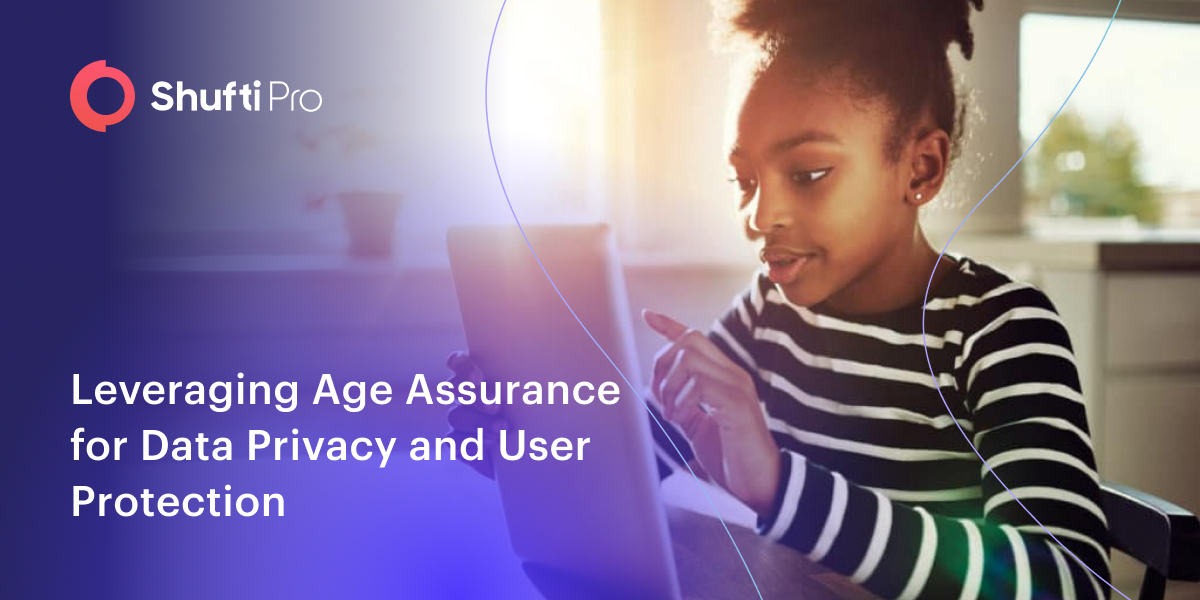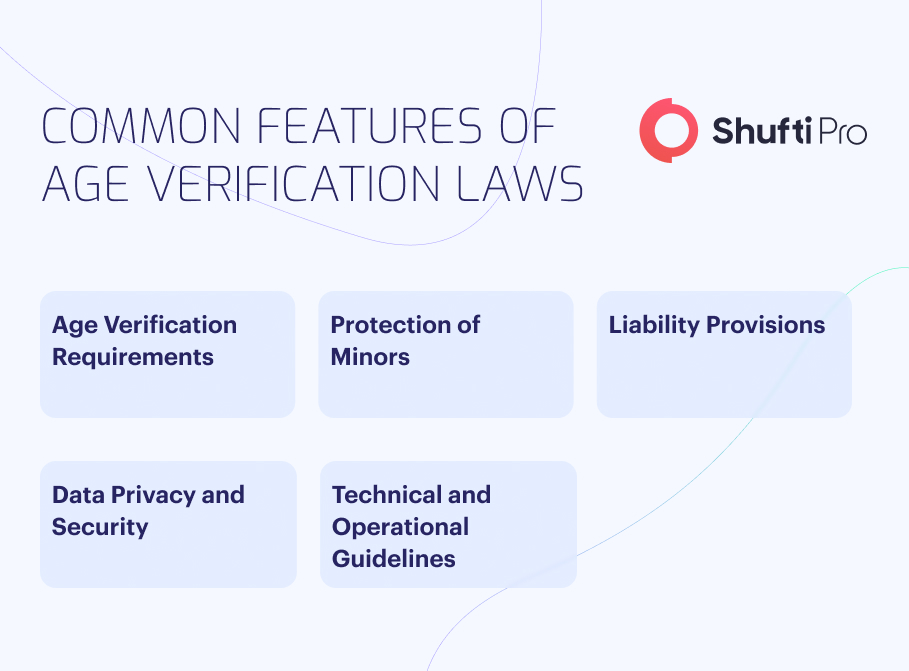Leveraging Age Assurance for Data Privacy and User Protection

Online age verification has gained great attention in recent years since many minors have been seen involved in illegal activities and crimes. Minors use their parent’s or adult identity to bypass the security network and use prohibited goods, services and more. This raises the concern regarding the child’s protection as fraudsters utilise their identity to use it for financial and illicit crimes.
To safeguard children from harm, several nations have made age verification a legal necessity, yet some states are still in the process of passing legislation requiring age verification. The primary focus of this law is to protect minors from potential risks and fraud whilst also protecting identity. As reported, identity theft cases have cost industries an amount of $7,918,961 with 17,140 reports and a 3.8% increase in reports with financial losses. This requires a dire need for a viable solution that protects from the growing crime and theft.
Age verification is more than just a law or a requirement but a crucial mechanism to regulate the accessibility of digital content and services. Understand the dire need for age verification for data privacy and user protection, along with the role of regulatory bodies in it.
What is Age Verification?
Age verification is a method that verifies a user satisfies a minimum age requirement by using third-party data or ID verification before giving access to age-restricted material, goods, or services. It gives companies a safe and secure solution to follow laws and regulations while granting access to age-appropriate users for online activity. A UNICEF poll conducted in 30 different countries found that more than one-third of young people reported experiencing cyberbullying. These figures are increasing steadily and don’t appear to be slowing down anytime soon.
Age verification solution is becoming a crucial security feature that websites must use to keep kids from accessing objectionable or banned content online. In the digital age, safeguarding children from such content is of utmost importance to governments across the globe.

Age Verification and Regulations Worldwide
Age verification is now required by law, in addition to moral and ethical considerations. Globally, governments and regulatory bodies have recognised the need to protect children and minors online. In addition to being a prudent business move, age verification is now mandated by laws and regulations. The regulatory agencies listed below are responsible for enforcing age verification laws:
- General Data Protection Regulation (GDPR)
- The UK Online Safety Bill (OSA)
- Data Protection Impact Assessments (DPIAs)
- Know Your Customer KYC regulations
- Children’s Online Privacy Protection Act (COPPA)
- The Customer Identification Programme (CIP) of the USA Patriot Act
- The Financial Action Task Force (FATF)
- Digital Services Act (DSA)
- Payment Card Industry Data Security Standard (PCI DSS)
- Financial Crimes Enforcement Network (FinCEN)
- Kids Online Safety Act (KOSA)
- Consumer Privacy Act (CCPA) and Personal Information Protection and Electronic Documents Act (PIPEDA) under the Consumer Privacy Act
- Financial Conduct Authority (FCA)
- United Nations Security Council Resolutions (UNSCR)
- Digital Personal Data Protection Act (DPDPA)
- Autorité de régulation de la communication audiovisuelle et numérique (ARCOM)
- International Civil Aviation Organisation (ICAO) standards
- Age Check Certification Scheme (ACCS)
Other than the above-mentioned regulatory bodies, every state has its own age verification law to protect minors and assure data privacy and user protection. For instance, Louisiana’s Age Verification Law (Act No 440), Utah’s Age Verification Law (S.B. 287), Virginia’s Age Verification Law (§18.2-246.8.), North Carolina’s Age Verification Law (G.S. 14-313), California Consumer Privacy Act (CCPA), Arkansas Age Verification Law (SB396), and Mississippi Age Verification Law (Mississippi Law) including Senate Bill 2346 (MS SB2346) and House Bill 1315 (HB 1315). Adhering to the above-stated legislation is a must, and failure to comply can result in severe penalties, harsh punishments and fines.
Recent Development in Age Verification Regulations
Stronger age verification regulations, according to critics, might be intrusive and dangerous for young people. Children’s privacy advocates have already voiced their opposition to the CAADCA, claiming that the bill’s wording is too vague and does not indicate substantial consequences for companies. Congressional Research Service (CSR) has outlined the current context and legislation of age verification covering all the requirements and the businesses impacted by it.
Businesses and data brokers run the danger of collecting personal data from minors by using age identification technologies. Many are concerned that providers of technology might monitor online behaviour and location in real-time. Before collecting or retaining any information about minor children, businesses must acquire parental consent to protect children and their privacy.
Methods of Age Verification
Adopting age verification technologies successfully requires careful preparation and consideration to ensure compliance and create a positive user experience. Digital firms must verify the age of their clients using trustworthy age verification solutions in order to maintain legal compliance. Additionally, these verification systems must be flexible enough to be modified to meet the requirements of different legal frameworks in different jurisdictions.
Age assurance features, which would react positively or adversely on the owner’s behalf to websites and online services that require evidence of age, have been discussed with major software companies. However, this creates an additional level of complexity. If someone uses a mobile device to verify their age, big internet companies would have access to more personal information. Additionally, it is presumed that the individual whose age is being confirmed has exclusive access to the concerned gadget, which is not always the case in shared homes.
To verify the age of potential clients, alternative age verification tactics can make use of cutting-edge technologies and methodologies. To avoid the trouble and cost of developing their own internal age verification systems, many online companies enter into contracts with well-known third parties. These companies have made it their goal to offer reliable age verification services, and they have access to a variety of adaptable choices.
In order to safely comply with existing rules and regulations, many internet businesses need to implement trustworthy age verification solutions to engage with their intended audience, which may include minors.
The Future of Age Verification
The age verification landscape is primed for innovation and legal development. By the time 2024 rolls around, a lot will have changed in the fields of technology and the laws pertaining to age verification.
Blockchain, AI, and biometrics are set to play important roles in providing solutions that prioritise user privacy while also being exact. With the help of these technologies, age verification might become a simple and intuitive process rather than a laborious requirement. This will shield enterprises from harsh penalties, fines, and sanctions in addition to shielding youngsters from being the victims of scammers. The risks are getting more complex every day, so the only solutions that can help are sophisticated, automated, AI-powered age verification systems. Given how the age verification method is currently developing, things will appear to improve.
How can Shufti Help?
Shufti offers businesses an AI-powered age verification solution that verifies a user’s age using official government-issued identification documents, such as a passport, ID card, and driver’s licence. Users just need to input their birthdate and hold their ID card up to a webcam or smartphone camera to prove their age. The state-of-the-art Shufti solution uses an OCR scanner to extract data from the ID document and then verifies both the data and the user’s face. This service may ascertain a person’s age rapidly, ensuring a seamless client experience and a high conversion rate while abiding by straightforward or intricate local and international rules.
Need to secure your business operations, enhance minor security, increase data privacy, and enhance user protection whilst maintaining compliance?

 Explore Now
Explore Now













